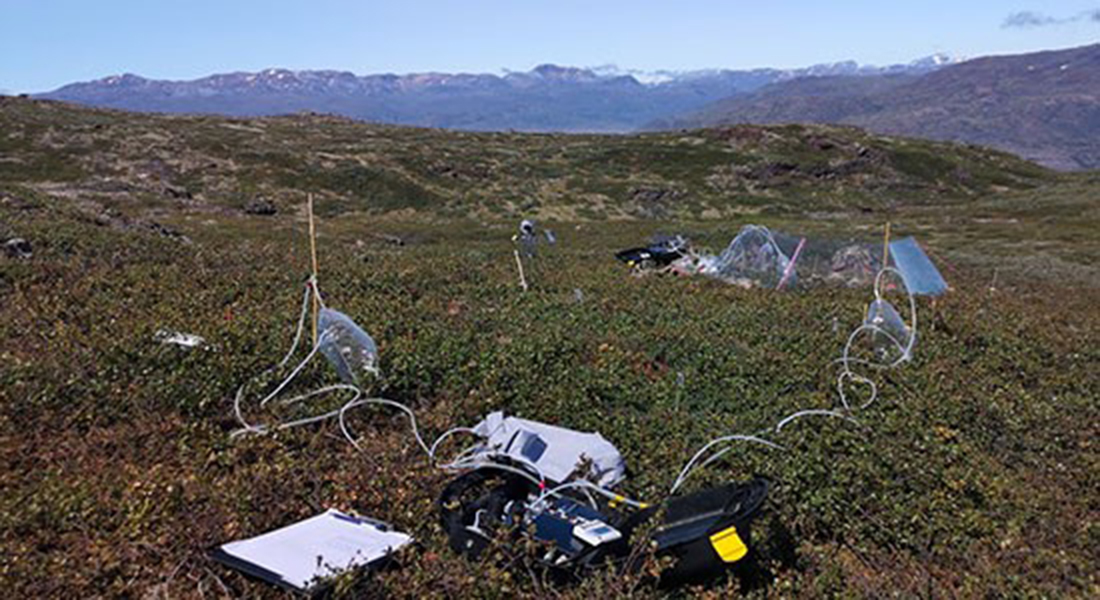PhD Defence:
Jolanta Rieksta
24. September 2021, at 10.00

Supervisors:
Prof. Riikka Rinnan, University of Copenhagen.
Co-supervisor: Prof. Tao Li, Sichuan University
Assessment committee
Associate Prof. Guy Schurgers, University of Copenhagen (chairman)
Senior Lecturer Andrea Clavijo McCormick, Massey University
Associate Prof. James D. Blande, University of Eastern Finland
Effects of insect herbivory and changing climate on biogenic volatile organic compound emissions in the Arctic
Abstract: Insect herbivory is a significant source of plant stress and, due to climate change, the herbivory stress is continuously increasing. In response to herbivory, plants produce specialized metabolites to fulfil physiological and ecological functions. Some of the specialized metabolites are released into the air and thus, are called volatile organic compounds (VOCs). VOCs are highly reactive and play an important role in biosphere-atmosphere interactions.
In the Arctic, climate warming proceeds at twice the rate of the global average and ecosystems are predicted to experience increased insect herbivore pressure and potentially higher VOC emissions. However, few studies have quantified plant VOC responses to insect herbivory under natural conditions in arctic ecosystems and even fewer studies have assessed how climatic changes that are predicted for arctic ecosystems, together with insect herbivory, affect VOC emissions in the Arctic.
The main aim of this thesis was to increase our understanding of how increased insect herbivore pressure affects VOC emissions in arctic ecosystems under future climatic conditions. To assess the effects of herbivory on VOC emissions, we exposed plants to local geometrid moth larvae and simulated herbivory treatment. We conducted these treatments in long-term field experiments manipulating climate warming and increased cloudiness (two future climatic changes predicted for arctic ecosystems). In addition, we used natural elevational gradients to represent a range of future climates. In this way, I could assess the combined influence of insect herbivory and climatic changes on VOC emissions. In all experiments, VOCs were collected using the branch enclosure method and analysed using gas chromatography-mass spectrometry.
The results generally showed that insect herbivory above background levels substantially increased VOC emissions from the three birch species studied – Betula pubescens var. pumila, Betula nana, and the Betula glanduosa-nana complex. Irrespective of the climatic conditions in future, insect herbivory will increase VOC emissions from birch in the Arctic. The results also showed that plant VOC responses to herbivory were highly variable and specific to species and study site. In some cases, plant VOC emission responses to herbivory were absent or the opposite of general expectations. The work presented here suggests that changes in plant traits upon experimental climate manipulations interact with insect herbivory and this challenges our understanding of how future climates will affect VOC emissions in arctic ecosystems.
To conclude, this thesis enhances our understanding and starts to fill the knowledge gap of how increased insect herbivore pressure and climate change affect VOC emissions from birch- dominated ecosystems. Furthermore, the work presented here shows the complexity of the relationships between insect herbivory and the effects of long-term climate treatments. The results suggest that insect herbivory is a significant driver of VOCs emitted during periods of active insect herbivore feeding and thus, should be accounted for when VOC emissions are scaled up from arctic ecosystems. The relationships between herbivory damage and VOC emissions found in this thesis can be used by modellers to separate the contributions of induced and constitutive emissions to the total VOCs emitted into the atmosphere and provide more input data for models from arctic ecosystems.
Sted
Aud - A2-70.04, Thorvaldsensvej 40, Frederiksberg
or join Zoom Meeting: https://ucph-ku.zoom.us/j/61903993386
Arrangør
Department of Biology
